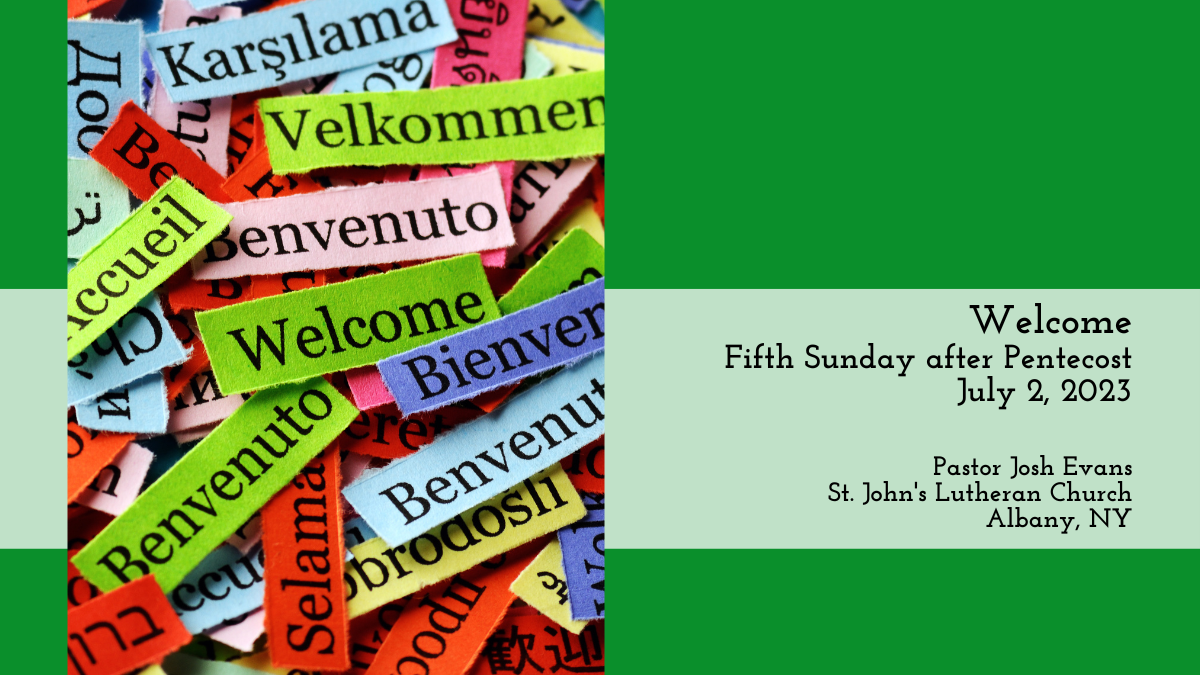St. John’s Lutheran Church
2 July 2023 + Lectionary 13a (5 Pentecost)
Matthew 10.40-42
Rev. Josh Evans
“Welcome.” It’s a word we throw around a lot.
As a part of social etiquette: “Thank you … you’re welcome!”
On the airplane’s final descent: “Welcome to Albany International Airport!”
Even in churches, as I began this and every service: “Welcome to worship.”
It’s a word we throw around so much, I wonder if we really think about what it means.
“Welcome,” as a noun, is defined by the dictionary as “an instance or manner of greeting someone.” As a verb, to “welcome” someone is to “greet [them] in a glad, polite, or friendly way” or “be glad to entertain (someone) or receive (something).”
Beyond conversational norms or a dictionary definition, in this morning’s gospel text, Jesus invites us to consider what it means to be welcoming: “Whoever welcomes you welcomes me, and whoever welcomes me welcomes the one who sent me.”
To be perfectly honest, I struggle with the concept of welcoming. Not because I don’t want to make this a safe and sacred space for all people – no matter their sexual orientation, gender identity or expression, racial or ethnic identity, age, ability, or socio-economic status, as our own welcome statement proclaims – because I really do. I suspect that’s also a big part of why you called me as your pastor.
I struggle with welcoming because, in my experience, there is far too often a catch. “All Are Welcome,” the sign reads or the hymn declares … but does that really include me? As someone who happens to be gay, those signs and hymns still give me pause because, along with so many others, I don’t have the privilege of walking into any random church and being fully welcomed and affirmed for who I am.
I also confess that I struggle with welcoming because, frankly, there are some folks I’d rather just not welcome myself.
***
In her 2013 memoir Pastrix: The Cranky, Beautiful Faith of a Sinner and Saint, Nadia Bolz-Weber reflects on her time as pastor of House for All Sinners and Saints, a mission development congregation located in Denver, Colorado. In her own words, House for All began as a community specifically meant to attract “the edgy, marginalized people” who couldn’t simply walk into any mainline Protestant church in town and see a room full of other people who looked just like them.
In 2011, just a few years after House for All was founded, Pastor Nadia was invited to preach at the Easter sunrise service at Red Rocks Amphitheater to a crowd of thousands, prompting the Denver Post to write a cover story about her and her congregation. Not surprisingly, interest in House for All soared, and suddenly, the normal crowd of 40-something on an average Sunday doubled in size.
Church growth like that is any pastor’s dream. “I wanted the ‘us’ to be bigger,” Nadia writes. “What I wasn’t prepared for was the ‘us’ to be different.”
Suddenly, the people who could walk into any other church in town and blend right in were coming to her church. “It felt horrible and I became angry. And then I felt horrible that I had become angry,” she confesses.
Then, on the cusp of a special all-church meeting to talk about their sudden growth and demographic changes, Nadia describes her “heart transplant” moment, in the spirit of Ezekiel when God tells the prophet: “I will give you a new heart and put a new spirit in you; I will remove from you your heart of stone and give you a heart of flesh.”
Nadia’s “heart transplant” came in the form of a phone call with a fellow pastor friend she had called to vent about everything that had been happening at her church and the “wrong kind of different” they were starting to attract.
“Yeah, that sucks,” her friend told her … sarcastically. “You guys are really good at ‘welcoming the stranger’ when it’s a young transgender person. But sometimes ‘the stranger’ looks like your mom and dad.”
***
“Whoever welcomes you welcomes me.” Jesus’s words are deceptively simple but oh so challenging.
Welcoming as Jesus bids us to welcome calls us beyond clever signs and catchy hymns.
Jesus’s invitation to welcome means welcoming the ones we want to welcome … and the ones who make us uncomfortable – those who might look or love or believe differently than us.
In welcoming the stranger, we welcome Jesus, who welcomes us first and unconditionally.
That’s the key for me.
Because, ultimately, the welcome we proclaim isn’t St. John’s welcome. It’s not the Upstate New York Synod’s welcome. It’s not the ELCA’s welcome. Lord knows we mess it up all the time.
The welcome we proclaim is first and always God’s welcome, which is whole and perfect.
The church is just invited along for the ride … and to try our best not to mess it up (too badly) … and to repent when we inevitably do.
***
God welcomes us here.
In holy baptism, God makes us members of God’s own family. In the eucharist, God sets as a place for us at the table.
By the dictionary definition, when God welcomes us, God is “glad to receive us.” God delights in our presence and the presence of each person gathered here.
God’s welcome isn’t just a word that God throws around. God’s welcome is the certain reality of our belovedness no matter what.
In God there is a welcome. In God we all belong. May that welcome – God’s welcome – be the church’s song and our lived practice.



